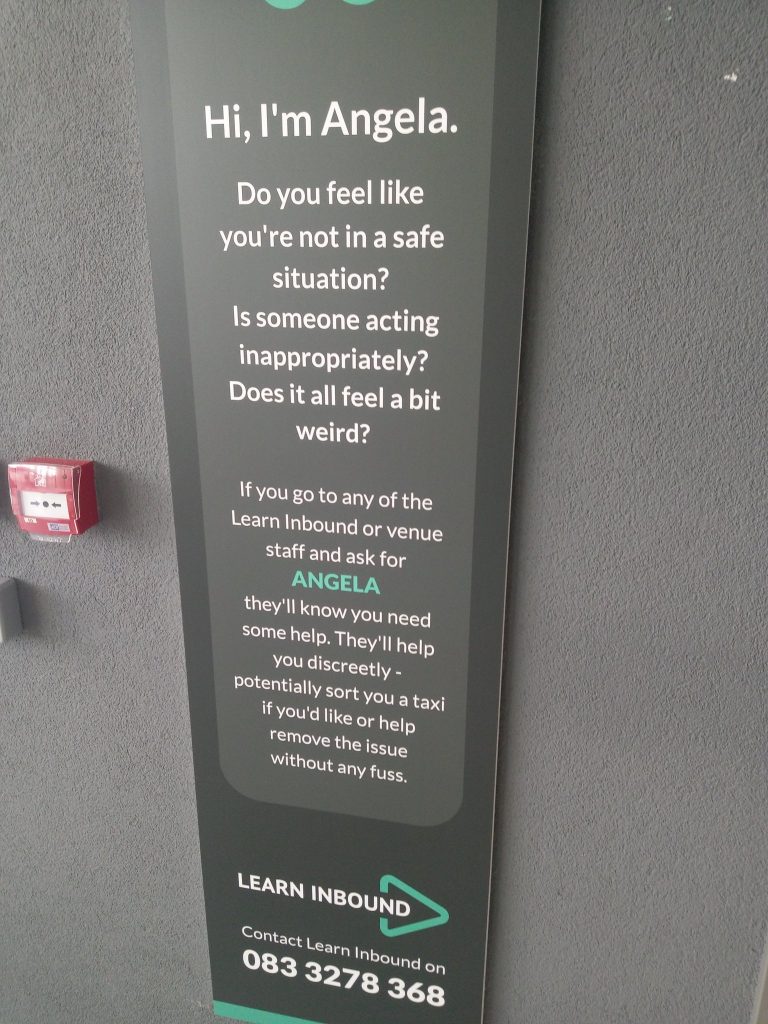
Women in Events: A Personal Account
There are plenty of accounts of what life is like for women in events. If you go looking, you’ll see the articles about how women in events make 22% less than their male counterparts. If you keep going, you’ll see the reports that tell us about the 61% of women who’ve encountered inappropriate behaviour since working in the events industry.
However, the power of the personal story is something I’ve always believed in. Firstly, the stories of women in events, whether they fall into any of statistics above or not, give us insight into the human side of the story; the richer, more complex reality that lies behind the numbers.
Secondly, sharing our stories allows us to celebrate the victories and positives of our professional narratives. Plus, while some of our experiences vary from the harrowing to the downright unbelievable (particularly in circumstances afflicting women of colour, trans women, and non-binary or gender non-conforming individuals), articulating how very real these histories are gives way for at least some catharsis. And a beginning to help fight against injustices like them happening again.
So, with those points in mind, I welcome you to hear my story of what it’s been like for me working in different aspects of the events industry over the past number of years.
My Experience as a Woman Speaking at Events
Gender diversity in my niche of the events world is not as bad as that of other segments. Only 25% of tech conference keynotes in the last three years were given by women, for example. Whereas, at industry events I’ve spoken at, the gaps are still big, but not quite as gargantuan.
If you’ve not visited our blog before, it’s worth noting that I’m in the marketing department at Tito. Specifically, I’m our Demand Gen Lead and focus on our inbound marketing efforts. As a result, that means that the events I speak at are focused on marketing or, given what our software at Tito was designed to do, about organising events.
Taking my three speaking engagements from last year as a sample, on average 39% of the speakers were women. I usually speak at smaller events like meetups where gender balance is generally healthy (from a binary perspective).
Most organisers will tell you it’s easy to get one man and one woman to speak at an event where two people are presenting, for example. More will tell you that, en masse, it becomes more difficult to achieve parity or socially-reflective diversity as the overall number of speakers increases. However, there are many more remedies than there are good excuses for that 39% average to continue (or get worse).
From my experience, here are some reasons I can see why women and non-binary folks aren’t applying — or accepting your invitation — to speak:
1) Women in Events Don’t Feel Safe
It can often feel like event organisers will debate the colour of their stage lights for days but will spend less than five minutes copying and pasting their Code of Conduct. Though you absolutely should of course definitely and without exception have a CoC, it’s not enough to simply have a code of conduct any more.
At worst, organisers who replicate Codes of Conduct like this don’t prioritise marginalised people’s safety. At best, they don’t know how to create a good CoC for their events and conferences. As a result, we see the same policy document regurgitated across event websites over and over again.
A generic CoC like that signals to people considering speaking at your events that you want to protect yourself from liability without actually considering what actions you will take at a personal and team level to ensure the safety of your attendees and speakers.
So, when you’re next putting together your event or conference copy and website, think about how you would feel if you were a person who has reason to be concerned about their safety in a cis male-dominated space being told, “Bad people will be punished! Quickly!” That might help you appreciate the need to be specific, thorough, and most of all genuine.
For inspiration, scroll down on the Layers website.
2) We Don’t Feel Prioritised
I remember all too vividly opening the email inviting me to speak at an event last year. I accepted it, ultimately, though I often questioned that decision afterwards. It’s common for part of an email like that to mention or link to the speakers that have already confirmed. The natural thing to do as the recipient is to check this out. In the case I’ve mentioned, everyone that had already accepted was male.
Don’t treat inviting women and marginalised people to speak at your event as an afterthought or a box to be checked. Instead, consider the underlying bias that could get you to a situation where your invited speakers are staring at a white-washed wall of middle-aged men.
Build your invite list to reflect the real world’s differences. Ensure that you’re sending a proportionate number of invitations to people of different genders and backgrounds.
Struggling with either of those? Check out organisations like Women and Colour, More Women’s Voices and the Women’s Speaker Initiative, as a start.
3) We Don’t Feel Valued
I’ve never been paid to speak. I don’t feel particularly bereft by that. As I mentioned, my speaking resumé mostly features smaller-scale events and usually these are free events without any revenue stream to pay speakers.
However, that’s not the norm for most speaking opportunities available. Here’s one account alone where “a woman of color speaker was unpaid, while a man who did the exact same amount of work, was paid several thousand dollars.” Monetary wealth ≠ the whole wealth of a person, but money inevitably helps people to further progress in their professions. Plus, if you’re paying one person for their time and effort, you shouldn’t overlook someone else doing the same work.
If we pause the question of money for a second, there are other areas where people who aren’t men are treated as being of inferior when it comes to their talks at events. In my experience, I’ve seen conferences put women on smaller stages under themes that aren’t fully related to their talks, leaving the main stage ripe to be a cis, male-dominated space.
There are myriad reasons that could explain why this happens. Perhaps the male speakers have more perceived value to the organiser. Perhaps it was just a logistical resolution.
Whatever the case, whether deliberate or unconscious, being mindful of where your non-male speakers speak is something to take into account if you’re working on diversifying your speaker pool.
You can also look to initiatives like the Gender Avenger list of excuses to make sure you don’t accidentally descend into any common pitfalls when it comes to excusing away your lack of non-male representation.
My Experience as a Woman Attending Events
In 2016 Curation Wall undertook a study of 14 digital marketing conferences, large and small, and investigated percentages of speaker line-ups by the presenter’s gender.
76.92% of marketing conferences in that year suffered from a gender gap in terms of male-identified and female-identified speakers, where male speakers were the majority.
Reader, I’ve been to two of those, and half of the smaller events they surveyed. While, on the whole, the numbers feel like they’ve improved from the time the tally was taken, I don’t have updated numbers to prove my case.
When it comes to attending conferences, having the company of people who aren’t exclusively male is great, and common (at least in my experience with marketing conferences, though that’s not always the case in tech).
The issues that make women in events feel less welcomed when attending conferences are more related to the experience than the gender of peers we meet. From my experience, here are some things that I’ve found respectively made me feel less welcome or right at home:
The Bad: No pronouns.
I’ve never been to an event that offers a way to know someone’s pronouns without asking, or being told. I know they exist, but I would like them to be ubiquitous. I’ve misgendered a fellow attendee in the past as a result. She then recommended that signifiers be used. She is a woman, and there are many people who would prefer their pronouns to be obvious. Or, indeed, to be provided with an obvious signal that any strangers they speak to at the event should ask about their pronouns.
This is something that affects people of all genders, and one that will help make women attending events feel more welcomed as a result.
The Bad: Water, water, nowhere. But lots of drops to drink.
I’m Irish. I appreciate that social occasions all too quickly become focused on booze. However, events on the whole seem to default to booze as the only possible way for strangers to enjoy themselves. The effect of that on women in events is a scary one.
A year or so ago I flew to Germany to attend a prestigious conference for startups that intertwined drinking alcohol into as many facets of the event as possible. That included hosting the half day networking event in a fricking bierhalle.
Aside from alcohol being so prevalent at events being difficult (if not extremely harmful) for anyone who has a history of disordered consumption, I felt massively vulnerable in this situation. I was a young woman away from home with a huge group of strangers in a country where I didn’t speak the language, expected to get drunk in the afternoon to “break the ice”.
All well and good if you want to offer alcohol as an option, but if even the smallest amount of thought was put into alternatives to provide a fun time, I, and the people who become more vulnerable in those situations, would greatly appreciate it.
The Good: Childcare.
One event I attended in 2019 offered creche services. (Thanks, Brighton SEO!) Again, ubiquity would be better, but it was so welcomed. Reasonable paternity and maternity leave compensation and allowances help the economy.
By the same token, being able to attend an event without having to worry about the added financial and emotional expense of being separated from your young children helps people of all genders participate at events and relax when they do.
The Good: Angela.
I was surprised when I saw my middle name emblazoned beside the main conference hall at a marketing event late last year. When I read on, I found it to be one of the most useful, reassuring things I’ve ever seen at a conference as a woman:

The things that make the biggest difference to women in events are the ones that reflect that the organisers truly care about your well-being and want you to be involved in every way you can without fear of anything we’ve talked about earlier dampening your experience.
A Quick Disclaimer
I myself am a cis, white woman and purport to only know — and am using this space to showcase — my own experience of the industry, which I acknowledge makes my circumstances pretty privileged.
This is one story in literally millions and I welcome comments, corrections, and discussion over on Twitter if you’d like to continue a conversation about any of the topics mentioned above.